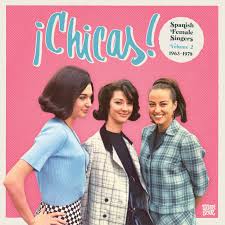Spanish pop might just be the last unexplored territory in forward-thinking European music. Over the last 30 years, as Anglo-American attitudes have started to relax and expand, musical connoisseurs have picked over French chanson, Italodisco, Belgium New Beat, Polish jazz and many more.
But Spanish music – with the odd exception in the shape of John Talabot or El Guincho – remains uncharted territory for anyone outside the Iberian Peninsular, reduced to a hazy memory of flamenco, Ibiza clubbing holidays and one-off novelty hits. And that’s just modern-day Spain: the country’s musical archive is, if anything, even more unknown.
Fighting this wildcat indifference is Vampisoul, a Madrid-based reissue label which has explored everything from New Orleans funk to "Peruvian groovers" in its bid to dig up musical nuggets. In 2011 it released ¡Chicas! Spanish Female Singers 1962-1974, a fabulous collection of obscure Spanish yé-yé, garage rock, soul and psychedelia, largely dug from B sides and commercial flops. It was a selection of music that was as vivacious as it was unlikely, coming from the patriarchal depths of Franco’s Spain where censors would pick over music releases for anything that clashed with their right-wing world views.
The second volume of the Chicas series sees Vicente Fabuel, renowned Spanish record collector, record shop owner and the mastermind behind the first Chicas album, back at the controls with a selection of music that is, if anything, even more obscure than the not-exactly household names on its predecessor. Many of the 28 tracks here are reissued for the first time and they include some "very hard-to-find records", the label claims. I’d certainly never heard of any of the artists here beyond the granite voiced Alicia Granados, who features on the first record.
The enlarged time frame – 63 to 78, versus 62 to 74 for Volume One – is also notable, with the music on Volume Two expanded to include 70s rock, ska and disco, as well as the soul, funk and psychedelia of the first record.
In general, though, the new compilation sticks pretty close to the modus operandi of Volume One. As with the first record, the promise of "Spanish female singers" proves slightly misleading – there are several non-Spanish singers here (Claudine Coppin, Donna Hightower and Elsa Baeza among them), as well as male / female duos (Spanish composer Antón García Abril features with Edda Dell’Orso, one of Ennio Morricone’s favourite singers) and bands.
There’s a similar range of material, too, taking in covers, both obscure (Claudya con Ramon y sus Showmen take on The Grassroots’ little known garage track ‘I’d Wait A Million Years’) and well-known (Donna Hightower’s ‘Tu Eres Mi Idolo’ is, strangely enough, a French-language version of ‘My Boy Lollipop’; Telstar also gets a mangling), as well as original material.
But, frankly, the journalistic urge to classify and compartmentalise can do a disservice to this album, which is best listened to in slightly dazed wonder. The music is familiar to the Anglo ear but warped and bent out of shape, recognisably in line with the US/UK pop tradition and yet true to a certain Spanishness at the same time.
‘La Misma Playa’, by Karina con Los Jaguars, combines surf pop with a full-blown Latin emotion, all deliciously rolled "r" sounds and vocal fury, with Karina sounding like she might break out of the studio and dance you to death at any moment, a rose between her teeth. If you were searching for the midpoint between flamenco and Jan and Dean, well, this is it. ‘Ponte Bajo el Sol’ by Elia and Elizabeth, meanwhile, is deliciously spooky, too unnerving to be pop, too delicate to be pure garage.
The effect is akin to when the British re-discovered Serge Gainsbourg, somewhere around the mid 90s; the revelation that pop music can exist outside of the Anglo Saxon tradition, one step removed and with slightly different influences but sharing a similar lineage, like African funk music or East German disco.
In fact, Gainsbourg isn’t a bad reference for much of the music here (not a surprise, given Spain’s geographical proximity to France). A small number of songs (notably Blanca Aurora’s Tu No Eres Ye-ye) are straight-up takes on the yé-yé tradition that Gainsbourg initially pioneered. Elsewhere, there are songs that share Gainsbourg’s love of the classical music tradition, innate melodicism and languorous white funk (the meandering bass that opens Sola’s Tabu,Tabu is pure Melody Nelson).
The other key reference points are Motown’s galloping horns, a musical style that fits very well with the fiery Latin vocal style (check Claudya con Ramon y sus Showmen’s ‘Un Millon de Lagrimas’ for evidence), and fuzzy 70s rock (The Satin Bells’ sweltering ‘Come C’mon’ is a particular highlight). Elsewhere we have ska, Bossa, disco, jazz, psychedelia and more, the quality of both songwriting and arranging brilliant throughout.
Fabuel has arranged the 28 tracks here so that they flow perfectly, each a delicate, logical step on from its neighbour, taking the reader on what dodgy trance DJs would doubtlessly refer to as a "journey". The end result is stunning, wrenching open a country-sized treasure box of unknown musical pearls and – if there’s any justice – going some way to address Spain’s unjust position as the sick man of European pop. Unknowing listeners may be surprised by the quality. They won’t be when Volume Three comes around.
<div class="fb-comments" data-href="http://thequietus.com/articles/17557-various-artists-chicas-2-vol-2-spanish-female-singers-1963-1978” data-width="550">


